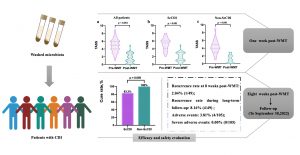
Washed microbiota transplantation for Clostridioides difficile infection: a national multi-center real-world study
Clostridioides difficile infection (CDI) is one of the most common healthcare-associated and community-acquired infections, posing a serious public health challenge due to the increase of morbidity, mortality, and medical costs. Antibiotic therapies are effective for the first episode of CDI in some patients, while the emergence of antibiotic resistance, exacerbation of dysbiosis, and the inability to fully eradicate residual spores will predispose to treatment failure and CDI relapse. Increasing trials supported the superior efficacy and safety of fecal microbiota transplantation (FMT) compared to currently available treatments. Additionally, the potential benefits of extending FMT for primary CDI have been proposed, and more relevant trials are currently underway.
How to make the best of FMT, a very effective but rough technology for the treatment of CDI, is a strong demand in the global medicine. An important advance in FMT is the standardization of its methodology to provide safer, more precise, and quality-controlled transplant therapy. The improved methods of FMT based on the automatic washing process and the related delivering consideration was named as washed microbiota transplantation, which has been endorsed as a consensus statement by the FMT-standardization study group. Considerable efforts had been made in
exploring the efficacy, safety, and therapy of WMT in inflammatory bowel disease (IBD) since 2014, however, its evaluation in the context of CDI is yet to be explored. Over the past three years, the detection kits for C. difficile have been approved and implemented in many medical centers in China, enabling the feasibility of conducting specialized research on CDI.
Therefore, we conducted a national multicenter, real-world study to evaluate the efficacy and safety of WMT for CDI and to analyze potential risk factors for efficacy, which was published in the Journal of Digestive Diseases.
This study was conducted at the Second Affiliated Hospital of Nanjing Medical University (NMU) and other medical centers applying for rescue WMT through the China Microbiota Transplantation System (CMTS) from October 1, 2021, to September 30, 2022. We broadly included patients with CDI with no restrictions on age and comorbidities, such as patients with concurrent IBD, with immunocompromised status, having ongoing non-CDI antibiotic requirements. Therefore, it provides a real-world perspective on patients with CDI and would offer valuable insights for clinical practice.
A total of 54 patients (aged 4 – 101 years old) with CDI undergoing 105 WMTs were included in the analysis. Thirty (55.6%) patients in this study met the criteria for severe and complicated CDI (ScCDI). Overall, 90.7% (49/54) of patients achieved clinical cure within 8-week post-WMT. The cure rate for ScCDI was 83.3%, and it reached 100% for non-ScCDI (n = 24, p = 0.059). No difference was observed in the clinical cure rate between patients with primary CDI and recurrent CDI (91.89% vs. 88.23%, p = 0.645). Significant improvement was observed in TASS scores one-week after WMT compared to three-day before WMT for all patients, the ScCDI group, and the non-ScCDI group (all p < 0.001), suggesting that WMT can induce rapid relief of gastrointestinal symptoms in CDI patients.
A WHO performance score of 4, age ≥ 65, higher TASS score, and higher Charlson comorbidity index score (p = 0.018, 0.03, 0.01, 0.034, respectively) were potential risk factors for efficacy.
We conducted a further analysis to evaluate the additional benefit of WMT in patients with IBD comorbidity. The majority of these IBD patients had moderate to severe disease severity (86.4%, 19/22). The clinical cure rate of CDI in this population was 90.9%, and 72.7% achieved a clinical response of IBD at 8-week post-WMT. The median mayo score and HBI score showed a significant decrease after WMT (p < 0.001, and p = 0.052, respectively). These findings provide support for the potential advantages of WMT in this population.
During the follow-up period, WMT-related AEs were observed in 3.8% (4/105) of the 105 WMTs. Most of these AEs were transient and relieved without medical intervention, including diarrhea (1.9%), fever (0.95%), and abdominal pain (0.95%). There was no difference in the rate of AEs between the ScCDI and non-ScCDI (3.33% vs 4.44%, p = 1.000). The delivery routes (upper GI vs. lower GI, 5.1% vs. 3.0%, p = 0.627) and microbial status (fresh vs. frozen, 6.7% vs. 2.7%, p = 0.322) had no significant impact on the incidence of AEs.
Four patients (8.16%, 4/49) experienced CDI recurrence at 1, 2.5, 3, and 4 months post-WMT, respectively. most of the patients (91.84%, 45/49) achieved sustained resolution after WMT during follow-up period. The recurrence rate at 8-week post-WMT was remarkably low, only 2.04% (1/49), in contrast to the reported rates of 15-20% with antibiotic intervention.
In conclusion, the current study demonstrates the attractive efficacy and safety of WMT in patients with CDI. The comparable high clinical cure rate and low recurrence rate observed in patients with ScCDI and non-ScCDI, as well as in primary and recurrent CDI, provide a broader scope of practice for WMT treatment of CDI. For medical centers with WMT accessibility, early administration of WMT is an essential consideration, particularly for patients in serious condition or with complex comorbidities.
These findings need to be further validated in larger sample sizes and RCT studies.

Reference:
Wu X, Ai R, Xu J, Wen Q, Pan H, Zhang Z, Wang N, Fang Y, Ding D, Wang Q, Han S, Liu X, Wu M, Jia Z, Song J, Lin T, Cui B, Nie Y, Wang X, Zhang F. Washed microbiota transplantation for Clostridioides difficile infection: a national multi-center real-world study. J Dig Dis. 2023 Sep 8. doi: 10.1111/1751-2980.13227. Epub ahead of print. PMID: 37681235.
https://onlinelibrary.wiley.com/doi/epdf/10.1111/1751-2980.13227


